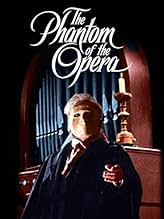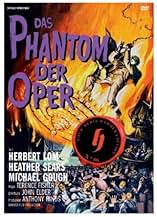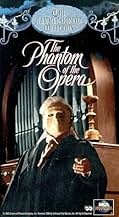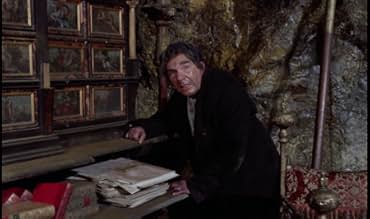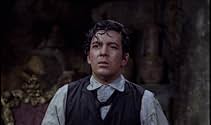AVALIAÇÃO DA IMDb
6,4/10
4 mil
SUA AVALIAÇÃO
Um compositor desfigurado por ácido vive escondido nos esgotos de Londres. Ele conta com a ajuda de um anão para raptar uma cantora de ópera e levá-la até seu refúgio subterrâneo.Um compositor desfigurado por ácido vive escondido nos esgotos de Londres. Ele conta com a ajuda de um anão para raptar uma cantora de ópera e levá-la até seu refúgio subterrâneo.Um compositor desfigurado por ácido vive escondido nos esgotos de Londres. Ele conta com a ajuda de um anão para raptar uma cantora de ópera e levá-la até seu refúgio subterrâneo.
- Direção
- Roteiristas
- Artistas
- Prêmios
- 1 indicação no total
Miriam Karlin
- Charwoman
- (as Miriam Carlin)
- Direção
- Roteiristas
- Elenco e equipe completos
- Produção, bilheteria e muito mais no IMDbPro
Avaliações em destaque
As far as adaptations of The Phantom of the Opera goes(excluding the Andrew Lloyd Webber musical), this 1962 Hammer version is not as good as Lon Chaney's, which is the best version, but it's superior to the Claude Rains version(though I do prefer Rains over Herbert Lom).
It does have its problems, with too much time spent on the opera and the romance and not enough of the Phantom, which does undermine the tension, sense of dread and horror. Sadly, the opera numbers, while musically good, are staged awkwardly and really do slow the film down. The romance is rather saccharine, and the chemistry between the two 'heroes' a little bland. Heather Sears also plays Christine too low-key and the script, while with some intelligent moments, does plod sometimes and has a little too much talk.
However, it is very lavishly made (one of the better looking early-60s Hammer films) with truly marvellous interiors of the opera house, rich vibrant colours and opulent costumes. It is beautifully and spine-chillingly scored, though James Bernard would have been an even better fit for composer. The story is less than perfect, but does offer some effective moments. The close up of the eye is really quite chilling and enough to make one jump, while the grasping hand over the stage and the lowering of the gas lamp are indeed very suspenseful, Phantom's back-story is interesting and makes one empathise with him and the ending is incredibly moving.
Terrence Fisher's direction is technically accomplished and does evoke some suspense and atmosphere, though his story-telling has been better elsewhere. Regarding the acting, Michael Gough steals the show being chillingly vile as a true slimeball with no redeeming qualities of a character. Herbert Lom is a great contrast as the Phantom, under heavy and effective make-up he is a sympathetic and tragic figure and it is quite a poignant performance, though not without a few scary moments. Edward De Souza is charming.
In conclusion, not among the best of Hammer by a long shot and could have been better, but still manages to be pretty good. 7/10 Bethany Cox
It does have its problems, with too much time spent on the opera and the romance and not enough of the Phantom, which does undermine the tension, sense of dread and horror. Sadly, the opera numbers, while musically good, are staged awkwardly and really do slow the film down. The romance is rather saccharine, and the chemistry between the two 'heroes' a little bland. Heather Sears also plays Christine too low-key and the script, while with some intelligent moments, does plod sometimes and has a little too much talk.
However, it is very lavishly made (one of the better looking early-60s Hammer films) with truly marvellous interiors of the opera house, rich vibrant colours and opulent costumes. It is beautifully and spine-chillingly scored, though James Bernard would have been an even better fit for composer. The story is less than perfect, but does offer some effective moments. The close up of the eye is really quite chilling and enough to make one jump, while the grasping hand over the stage and the lowering of the gas lamp are indeed very suspenseful, Phantom's back-story is interesting and makes one empathise with him and the ending is incredibly moving.
Terrence Fisher's direction is technically accomplished and does evoke some suspense and atmosphere, though his story-telling has been better elsewhere. Regarding the acting, Michael Gough steals the show being chillingly vile as a true slimeball with no redeeming qualities of a character. Herbert Lom is a great contrast as the Phantom, under heavy and effective make-up he is a sympathetic and tragic figure and it is quite a poignant performance, though not without a few scary moments. Edward De Souza is charming.
In conclusion, not among the best of Hammer by a long shot and could have been better, but still manages to be pretty good. 7/10 Bethany Cox
In this version of The Phantom Of The Opera, the hideous phantom lurks in the sewers and catacombs of London instead of Paris. And in this third version bits of a real opera by British composer Edwin Astley highlight the musical portion of the film. That's important because in this telling of the tale, the phantom has a singular interest in this particular work.
Stepping into the shoes of Lon Chaney and Claude Rains is Herbert Lom. Because this film is done in flashback Lom is given less of a chance to create his character in the way his predecessors did. Still Lom as he did in Night And The City manages to get across both the poignancy and the evil that he's sunk to. I would also compare his characterization of Professor Petri here with what he did in Flame Over India where he got across sympathy for a character who was a terrorist.
The truly evil one here is Michael Gough who is a classic Victorian rakehell whom if he were slightly of better character and given to a bit of introspection, we could hear some Oscar Wilde aphorisms coming out of his mouth. But his Lord D'Arcy hasn't got any redeeming features whatsover. Kind of like Liberty Valance which also came out in 1962.
The young lovers here are producer Edward DeSouza and Heather Sears the singer that Lom takes an interest in. I looked to see who might have dubbed Sears for the opera sequences and found no credit. If she did it herself, truly remarkable and why didn't that part of her talent be better known.
I saw an edited version of this on YouTube and I'm convinced they involved the end of some characters in a ghastly fashion. I'd like to see a director's cut if possible.
Stepping into the shoes of Lon Chaney and Claude Rains is Herbert Lom. Because this film is done in flashback Lom is given less of a chance to create his character in the way his predecessors did. Still Lom as he did in Night And The City manages to get across both the poignancy and the evil that he's sunk to. I would also compare his characterization of Professor Petri here with what he did in Flame Over India where he got across sympathy for a character who was a terrorist.
The truly evil one here is Michael Gough who is a classic Victorian rakehell whom if he were slightly of better character and given to a bit of introspection, we could hear some Oscar Wilde aphorisms coming out of his mouth. But his Lord D'Arcy hasn't got any redeeming features whatsover. Kind of like Liberty Valance which also came out in 1962.
The young lovers here are producer Edward DeSouza and Heather Sears the singer that Lom takes an interest in. I looked to see who might have dubbed Sears for the opera sequences and found no credit. If she did it herself, truly remarkable and why didn't that part of her talent be better known.
I saw an edited version of this on YouTube and I'm convinced they involved the end of some characters in a ghastly fashion. I'd like to see a director's cut if possible.
Each "Phantom of the Opera" deviates somewhat from the Leroux novel - with the original silent film with Lon Chaney perhaps being the exception. In the '40s Nelson Eddy version, the police chief and an operatic baritone are Christine's suitors instead of Raoul (though the baritone is named Raoul) and it's hinted that the Phantom is her father. His acid in the face was the result of a misunderstanding at the music publisher's.
In this particular "Phantom," from Hammer Studios, the Phantom (Herbert Lom) has an Igor-type assistant, and here Christine's suitor is the manager of the opera house (Edward de Souza). There is also a real villain, a plagiarist in the form of Lord d'Arcy (Michael Gough). Most notably, it has a production of "Joan of Arc" with music written by Edwin T. Astley that is actually very pretty and beautifully sung.
Everyone does a terrific job in this - Gough is hateful as the supposed composer of the opera; de Souza is a hunk and a good romantic interest for Christine; and Heather Sears as Christine is very sweet and, like all Christines, lacking the diva quality her rival has. In this film, the rival singer is a very minor role. The dubbing of the voices is wonderful.
Herbert Lom, normally a comic character in the "Pink Panther" series, is a great phantom, performed at a time when the Phantom didn't have to be better-looking than the ingénue. The Phantom is not a huge role in this film, but an effective and highly sympathetic one. He seems a little less nuts than some of them, though he's clearly not completely there.
The final scene of this film is very exciting, and the final picture very powerful and sad. This is a really excellent version with not much emphasis on the horror aspects of the Chaney film. It has good production values and is very well directed.
In this particular "Phantom," from Hammer Studios, the Phantom (Herbert Lom) has an Igor-type assistant, and here Christine's suitor is the manager of the opera house (Edward de Souza). There is also a real villain, a plagiarist in the form of Lord d'Arcy (Michael Gough). Most notably, it has a production of "Joan of Arc" with music written by Edwin T. Astley that is actually very pretty and beautifully sung.
Everyone does a terrific job in this - Gough is hateful as the supposed composer of the opera; de Souza is a hunk and a good romantic interest for Christine; and Heather Sears as Christine is very sweet and, like all Christines, lacking the diva quality her rival has. In this film, the rival singer is a very minor role. The dubbing of the voices is wonderful.
Herbert Lom, normally a comic character in the "Pink Panther" series, is a great phantom, performed at a time when the Phantom didn't have to be better-looking than the ingénue. The Phantom is not a huge role in this film, but an effective and highly sympathetic one. He seems a little less nuts than some of them, though he's clearly not completely there.
The final scene of this film is very exciting, and the final picture very powerful and sad. This is a really excellent version with not much emphasis on the horror aspects of the Chaney film. It has good production values and is very well directed.
This is the Phantom that scared the heck out of me when I was a kid, and comes in second after the classic Lon Chaney version. It is the only color version that really works, here given that garish, over-the-top gothic treatment that worked so well for Hammer Studios. It doesn't have the ponderous, plodding feel of the book or other versions, and follows through with a scary shot-in-the-arm or two. More complete video stores should have this on the shelf.
I have many other "Phantom" movies but this is one of my favorites, even though the location and story has been changed. I thought Herbert Lom did a great job and the aria Christine sings is hauntingly beautiful. I would love to have a CD of the music. Does anyone know if it is available?
Você sabia?
- CuriosidadesThe "London Opera House" used here is actually the Wimbledon Theatre.
- Erros de gravaçãoA boom crane is visible in Christine's dressing room mirror briefly when the Phantom first speaks to her.
- Citações
Harry Hunter: What I don't understand is how Ambrose d'Arcy can write so much excellent music in the last few years when he has so little musical taste.
- Versões alternativasThe UK cinema version was cut by the BBFC for an 'A' (PG) certificate and edited the eye-stabbing of the rat-catcher and shots of a hanging body, as well as extensive edits to scenes showing the creation and final unmasking of the Phantom. Later video and DVD releases were uncut.
- ConexõesFeatured in Aweful Movies with Deadly Earnest: The Phantom of the Opera (1973)
- Trilhas sonorasJoan of Arc
by Edwin Astley
Principais escolhas
Faça login para avaliar e ver a lista de recomendações personalizadas
Detalhes
- Data de lançamento
- País de origem
- Idioma
- Também conhecido como
- El fantasma de la ópera
- Locações de filme
- New Wimbledon Theatre, The Broadway, Wimbledon, Londres, Inglaterra, Reino Unido(Theatre Auditorium Interiors)
- Empresa de produção
- Consulte mais créditos da empresa na IMDbPro
Bilheteria
- Orçamento
- £ 180.000 (estimativa)
- Tempo de duração1 hora 30 minutos
- Proporção
- 1.66 : 1
Contribua para esta página
Sugerir uma alteração ou adicionar conteúdo ausente

Principal brecha
By what name was O Fantasma da Ópera (1962) officially released in India in English?
Responda

